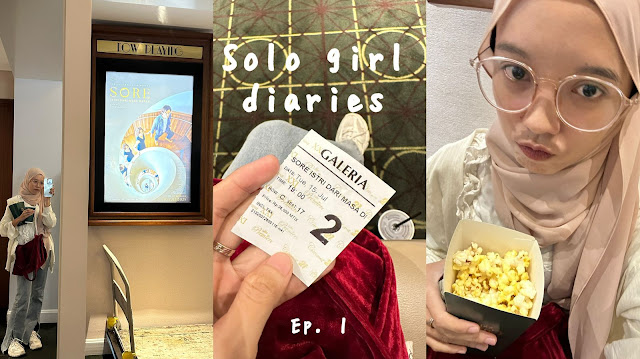Hanya 7 Jam di Ubud, Bisa Ngapain Aja?
What if you only have 7 hours in Ubud, and you want to maximize your time there?
Tenang, kamu tetap bisa menikmati pengalaman seru walaupun waktunya singkat! Di tulisan kali ini aku mau share daily activity yang aku lakukan seharian di Ubud.
Healing Singkat, Ubud Version 🌿
1. Explore Jalan Goutama
2. Mampir ke Kevala Ceramic
4. Lowbatt? Mampir ke Dang!Cookies
5. Kembali ke Denpasar
Kalau kalian penasaran keseruan kami, bisa cek vlog-nya di bawah ini ya. Sampai ketemu di cerita jalan-jalan berikutnya!
What if you only have 7 hours in Ubud, and you want to maximize your time there?
Tenang, kamu tetap bisa menikmati pengalaman seru walaupun waktunya singkat! Di tulisan kali ini aku mau share daily activity yang aku lakukan seharian di Ubud.
Healing Singkat, Ubud Version 🌿
Beberapa waktu lalu aku dan temanku lagi penat sama rutinitas, akhirnya kami memutuskan untuk healing sejenak dari hiruk pikuk dunia dan kabur sebentar ke Ubud. Plan-nya sederhana: nikmati suasana, explore tempat baru, makan enak, lalu pulang dengan hati yang lebih tenang.
Kami memilih naik Metro Dewata Trans dari Denpasar ke Ubud. Tiketnya cuma sekitar Rp4.200 sekali jalan, super hemat dibanding nyetir sendiri. Titik kumpulnya ada di Terminal Ubung, kami berangkat sekitar pukul 09.00.
Ternyata perjalanan ke Ubud cuma 1 jam! Busnya nyaman, nggak terlalu ramai, dan jauh lebih santai daripada harus capek macet-macetan bawa motor atau mobil sendiri. Semoga ke depannya transportasi umum di Bali makin banyak jalurnya, biar makin banyak orang yang bisa menikmati perjalanan kayak gini.
Sesampainya di Ubud, kami langsung jalan ke Jalan Goutama. Lucunya, meskipun aku sudah sering ke Ubud, aku belum pernah bener-bener eksplor jalan ini. Biasanya kalau naik motor agak males parkir, jadi sering skip. Padahal di sini banyak banget toko unik, kafe lucu, dan spot foto yang estetik. Worth it banget buat jalan santai sambil lihat-lihat.
2. Mampir ke Kevala Ceramic
Sambil jalan, mata kami langsung tertarik sama display keramik cantik dari Kevala Ceramic. Begitu masuk, kami disambut staff yang ramah banget dan sempat dijelaskan tentang proses pembuatan keramik mereka.
Ternyata mereka juga punya kelas pottery di Sanur, kayaknya seru banget buat yang mau coba bikin keramik sendiri. Definitely masuk bucket list aku next time!
3. Lunch: Rendang Legendaris di Waroeng Bernadette 🍴
Setelah puas jalan sekitar 1 jam, waktunya makan siang. Kami memilih Waroeng Bernadette di Jalan Penestanan, yang terkenal dengan menu rendangnya.
Dan bener aja, rendangnya super empuk dan kaya rasa, sate-nya juicy, sambalnya nagih, dan ditutup dengan dadar gulung legit yang manisnya pas. Rasanya kayak makan masakan rumahan versi lebih mewah.
4. Lowbatt? Mampir ke Dang!Cookies
Device kami sebenarnya nggak lagi lowbatt sih hehe, tapi aku mau rekomendasiin café yang jual cookies sekaligus punya charging spot buat kalian! Siapa tahu hp kalian sekarat (maklum, foto-foto terus), bisa banget mampir sebentar ke Dang!Cookies.
Di sini ada bar spot dengan charging station, lifesaver banget buat traveler. Sambil nunggu hp penuh, bisa ngemil cookies yang chewy, manisnya pas, dan super enak. Benar-benar perfect pit stop sebelum lanjut jalan lagi!
5. Kembali ke Denpasar
Sayangnya, waktu 7 jam memang cepat berlalu. Kami harus mengejar bus terakhir jam 5 sore, jadi dari kafe kami jalan kaki ke Monkey Forest Road untuk naik bus balik ke Denpasar.
Walaupun singkat, perjalanan kali ini benar-benar menyenangkan. Aku suka banget jalan kaki di Ubud , meskipun trotoarnya belum semua rapi, tapi atmosfernya bikin betah. Next time aku pengen explore lebih banyak hidden gems di Ubud.
Kalau kalian penasaran keseruan kami, bisa cek vlog-nya di bawah ini ya. Sampai ketemu di cerita jalan-jalan berikutnya!























